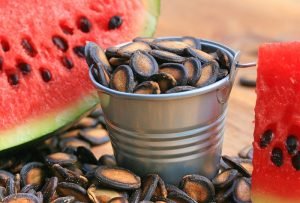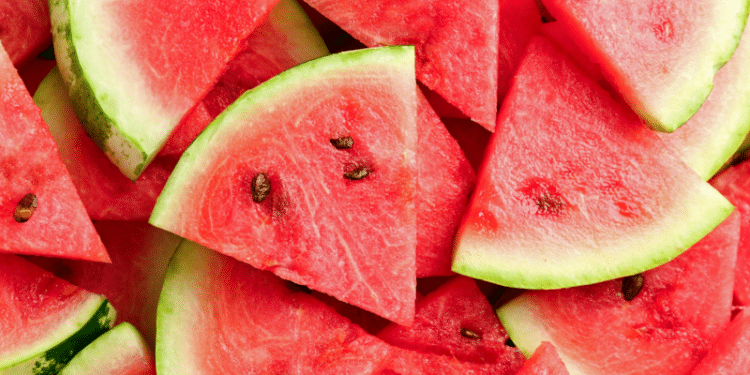Watermelon is one of the most loved summer fruits. In fact, this squashy, juicy fruit needs no introduction and is widely available in the market. It is an incredibly hydrating fruit, as it contains around 92 per cent of water, and is enriched with a lot of essential minerals and vitamins.
This red, squashy, juicy melon also contains a lot of seeds, which we usually remove from the fruit and throw away after consumption. Some people just opt for seedless. However, the rich nutritional value of watermelon seeds may convince you otherwise. The tiny seeds inside the huge watermelon fruit have some magical properties; they are super nutritious and healthy.
Watermelon seeds are low in calories and offer an array of micronutrients like copper, zinc, potassium, magnesium, iron, folate, etc; which have various health benefits.
Low calorie: One ounce of watermelon seed kernels contains approximately 158 calories. That’s not much lower than an ounce of Lay’s Potato Chips (160 calories), but let’s take a look at what constitutes an ounce. A large handful of watermelon seeds weigh about 4 grams and contain about just 23 calories. Far less than a bag of potato chips!
Magnesium: One of several minerals found in watermelon seeds is magnesium. In a 4-gram serving, you’ll get 21 mg of magnesium, which is 5 per cent of the daily value. The National Institutes of Health (NIH) recommends adults get 420 mg of this mineral daily. Magnesium is essential for many of the body’s metabolic functions. It’s also required to maintain nerve and muscle function, as well as immune, heart, and bone health.
Iron: A handful of watermelon seeds contains about 0.29 mg of iron, or about 1.6 per cent of the daily value. It might not seem like much, but the NIH only recommends adults get 18 mg in their day. Iron is an important component of haemoglobin — carrying oxygen through the body. It also helps your body convert calories into energy. However, watermelon seeds contain phytate, which decreases the absorption of iron and reduces their nutritional value.
“Good” fats: Watermelon seeds also provide a good source of both monounsaturated and polyunsaturated fatty acids — one large handful (4 grams) provides 0.3 and 1.1 grams, respectively. According to the American Heart Association, these fats are useful in protecting against heart attack and stroke and lowering levels of “bad” cholesterol in the blood.
Zinc: Watermelon seeds are also a good source of zinc. They provide about 26 per cent of the daily value in one ounce, or 4 per cent DV in one large handful (4 grams). Zinc is an important nutrient, essential to the immune system. It’s also necessary for the body’s digestive and nervous systems; cell regrowth and division; and your senses of taste and smell. However, just like with iron, phytates reduce the absorption of zinc.

Some of the health benefits of eating watermelon seeds are listed below:
Good for heart and immunity: Watermelon seeds are also linked with stronger immunity and better health. Due to the presence of magnesium, these seeds can also cure hypertension, which is directly related to heart health. Consumption of watermelon seeds daily in moderate quantities helps boost your heart health and maintain your blood pressure.
Makes your bones stronger: Watermelon seeds have a high content of minerals like copper, manganese and potassium. And these minerals together with other micronutrients help in making our bones healthier. The seeds are linked with strengthening our bones and also improving bone density.
Boosts metabolism: Watermelon seeds are a powerhouse of nutrients like folate, iron, zinc, copper, magnesium, and potassium. These seeds are considered to be highly nutritious, as they are also rich in amino acids, proteins and vitamin B complex. All these nutrients together help in boosting your body’s metabolism.
Supports nervous system: Watermelon seeds are a rich source of vitamin B which helps to keep your brain and nervous system healthy. It is also useful in mood disorders, and dementia.
Improves male fertility: Watermelon contains a high amount of zinc which is important for the male reproductive system. Zinc can help to improve the quality of sperm which is the major issue in male infertility.
No unhealthy fat: They contain certain healthy fats, which are extremely important for the body. Watermelon seeds are a good source of healthy fatty acids like oleic acid, and linoleum acid which are required for the proper functioning of the body.
Good for diabetics: These black seeds are really helpful in controlling diabetes. It is known to reduce elevated blood sugar levels and therefore can be a good snack option for patients with diabetes.
Gives you glowing skin: Watermelon seed oil is widely used as the main ingredient for cosmetic products that work wonders in treating acne and early signs of ageing. These seeds have antioxidants that help reverse early skin ageing. Consumption of these seeds can provide your skin with an inner glow. Add a few seeds to your daily diet to get visibly healthy skin. Also, due to the presence of fatty acids, it prevents dryness and provides hydration to the damaged skin.
Improves the quality of hair: The seeds are filled with proteins and iron that are known to improve the texture and quality of hair. It helps in strengthening your hair strands and also it promotes hair regrowth. As these are high in magnesium content it makes the hair healthy, which in turn prevents hair fall and damage.
How to use watermelon seeds in your daily life
Dry the watermelon seeds and roast them in a pan. Store them for many days in airtight containers. This can be a healthy yet delicious snacking option for those who always feel hungry! These will provide you with a boost of nutrition and you can add these tiny seeds to your salads or other nuts for that added benefit. If you don’t want to eat it as a seed, then you can also make it into a powder and enjoy the same flavour and benefits.
How to roast watermelon seeds
Roasting watermelon seeds is easy. Set your oven to 325°F and place the seeds on a baking sheet. It should only take about 15 minutes for them to roast, but you may want to stir them halfway through to ensure even crispiness.
You can make the seeds taste even better by adding a little olive oil and salt or sprinkling them with cinnamon and a light dusting of sugar. If you prefer more flavour, you can add lime juice and chilli powder, or even cayenne pepper.
The takeaway
Watermelon seeds have many health benefits. Although the amounts of some minerals and vitamins within them may seem low, they are still far preferable to potato chips and other unhealthy snacks.
How much nutrition you reap from watermelon seeds depends largely on how many you eat. Because they’re small, you need to eat quite a few to get their considerable benefits.
However, when you compare their nutritional value to that of other snacks, watermelon seeds come out far ahead.











